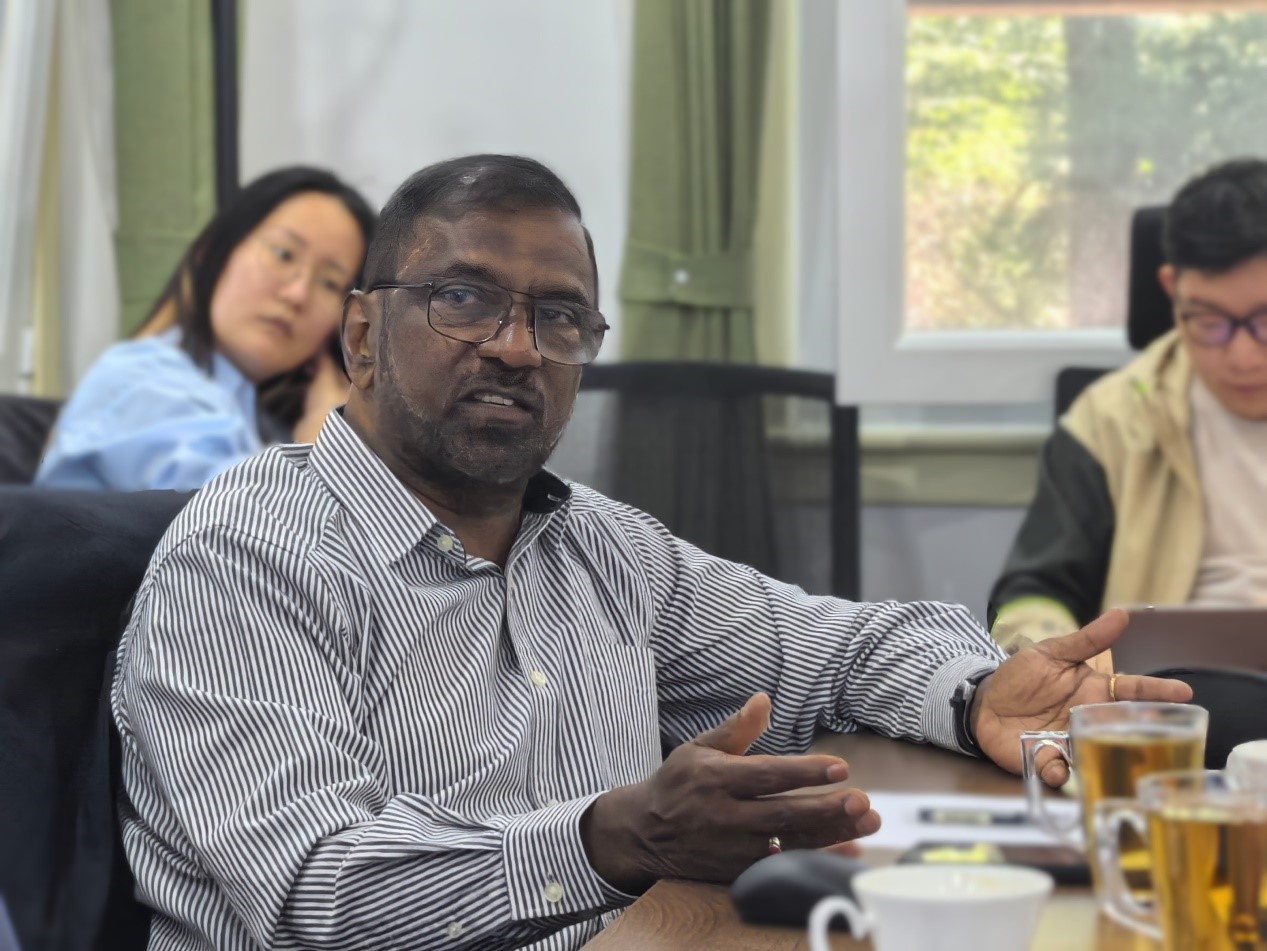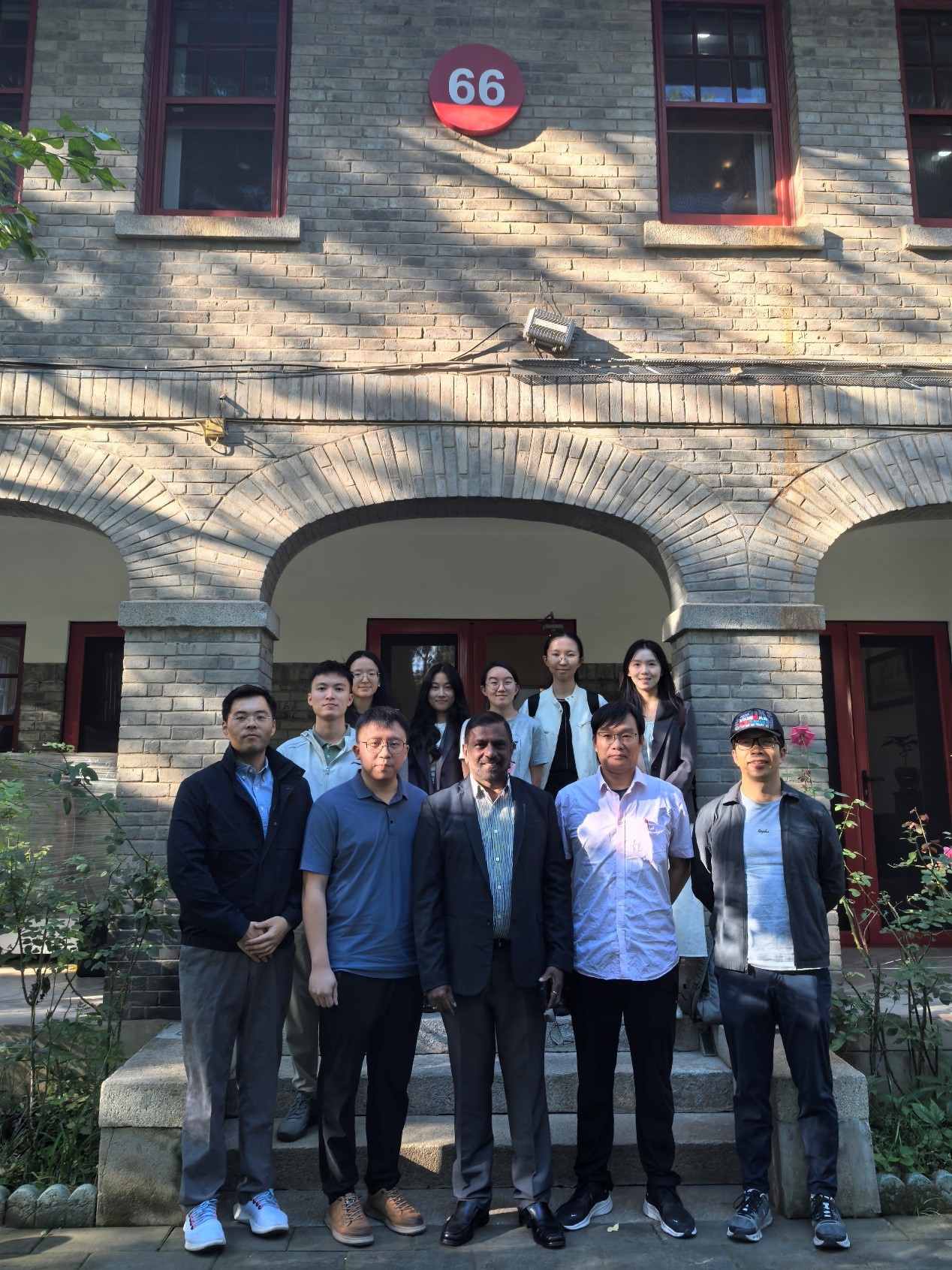
The 59th session of the “Adventus Amicorum” seminar series organized by the Institute of Area Studies, Peking University (PKUIAS) took place on September 17, 2025. The lecture, titled “Indian Ocean Maritime Security Dynamics,” featured Jayanath Colombage, a distinguished fellow at the Pathfinder Foundation in Sri Lanka and a fellow of the Royal Institute of Navigation. The event was moderated by Prof. Zan Tao, deputy director of PKUIAS. The discussants included Xie Kankan, associate professor from PKU's School of Foreign Languages; Lin Zhaoran, postdoctoral fellow from the Law School at Peking University; and Ma Yuchen, postdoctoral fellow from PKU’s School of Foreign Languages, along with other faculty and students.
Prof. Colombage began by providing an overview of the Indian Ocean, emphasizing its increasing importance on the global stage. As the only ocean named after a country, the Indian Ocean encompasses 36 littoral and 11 landlocked nations, has witnessed numerous significant historical events, including two World Wars, and has gained growing prominence since the 21st century. It connects four continents, accounts for one-third of the world’s population, and holds strategic significance due to its proximity to seven key chokepoints, such as the Strait of Hormuz and the Suez Canal. These waterways serve as vital lifelines for global oil and cargo transportation, making the security and stability of the Indian Ocean crucial for many countries worldwide. However, the Indian Ocean and surrounding areas also harbor eight potential conflict points, including India and Pakistan, Israel and Palestine, Iran, Yemen, and others.
Prof. Colombage highlighted China’s rise as an undeniable factor since the end of the Cold War, signaling the decline of the unipolar world order led by the US. In the future, people will likely face a multipolar world, and therefore, countries need to strengthen cooperation to address challenges jointly. He summarized the current situation in the Indian Ocean using six words: strategic competition, strategic engagement, strategic confusion, strategic ambiguity, strategic chaos, and strategic dilemmas. The three core issues faced by nations in the region are resources, markets, and military bases. Additionally, safeguarding the sea lanes in the Indian Ocean has become a crucial strategic task for many countries.
Prof. Colombage identified two main categories of security threats in the Indian Ocean: traditional and non-traditional. Traditional security threats include great power competition, nuclear war, spillover effects from land-based conflicts, anarchy and failed states, and trade route disruptions caused by great power competition. Non-traditional security threats encompass piracy, maritime terrorism, maritime smuggling, illegal fishing, climate change, rising sea levels, and marine pollution. Non-state actor threats also pose significant concerns.
Prof. Colombage noted the existence of multiple maritime cooperation initiatives in the region, including China’s Belt and Road initiative, the China–Pakistan Economic Corridor, India’s Maritime Security Cooperation initiative, Japan’s “Free and Open Indo-Pacific” strategy, the US’s “Indo-Pacific Strategy,” and the ASEAN Outlook on the Indo-Pacific. However, the region also faces the risk of conflict due to its high level of militarization. The existence of military alliances such as the QUAD and AUKUS further highlights the need for countries to strengthen communication and coordination to avoid military conflicts.
Prof. Colombage concluded by outlining the ideal state of security in the Indian Ocean and the cooperation challenges currently facing the region. To maintain peace in the Indian Ocean, countries ideally need to peacefully resolve disputes, maintain strategic restraint, enhance mutual trust measures, and pursue win-win rather than zero-sum outcomes. This requires strong and stable political leadership to prevent the region from being drawn into unnecessary military conflicts. The current challenges to cooperation stem from insufficient mutual trust among countries, a lack of capabilities and technology, a limited understanding of marine resources and sustainability, and inadequate political will for cooperation. He emphasized that many states in the Indian Ocean do not wish to be forced to choose sides, but hope that countries in the region can cooperate and develop peacefully. To achieve this, the region needs to maintain peace and stability within an international rules-based maritime order and achieve sustainable security through comprehensive cooperation.

During the Q&A session, participants engaged in a lively discussion on the prospects for cooperation in the Indian Ocean and the order of the region from an international law perspective. Addressing the question of how small countries perceive the future of Indian Ocean cooperation mechanisms, Prof. Colombage responded that small nations are the most eager ones for regional stability and multilateral cooperation. However, the autonomy of small states in the Indian Ocean region is largely constrained by the security strategies of major powers. The key to Indian Ocean cooperation mechanisms lies in overcoming the trust deficit and security concerns between major powers, thereby building a core bridge for regional cooperation.


